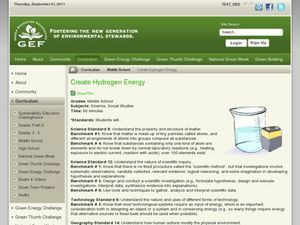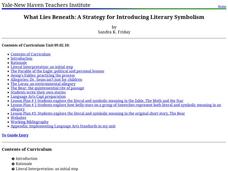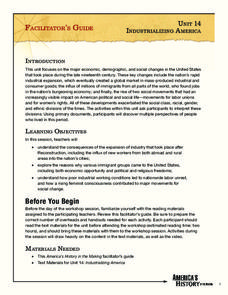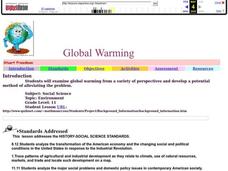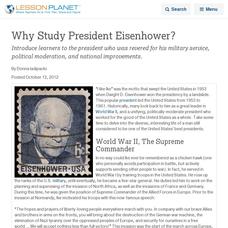Core Knowledge Foundation
Marching into Civil War Times: Little Women, Past and Present
Here is a fine unit of lessons which compare and contrast the culture during the time period of the classic book, Little Women to present day. Topics covered are the family, politics, morality, fashion, transportation, cities, historical...
Curated OER
Liberty and Security in Contemporary China
Upper graders consider contemporary Chinese economics, political viewpoints, and government. This unit covers a span of several class periods or six days, and engages learners in a variety of skills based activities. They conduct...
Curated OER
Dragonwings: Evaluate Chapters 10-12
As your class finishes the novel Dragonwings, use these culminating projects. A vocabulary list is given for chapters eleven and twelve and either an epitaph or letter activity concludes the book. The final project consists of creating a...
Curated OER
Create Hydrogen Energy
Students complete an experiment to understand changes to the environment over time. In this hydrogen lesson, students discuss electrolysis and conduct an electrolysis experiment. Students observe and record their experiment.
Curated OER
Vietnam 1945 - 1975 :The 10,000 Day War
Each phase of the Vietnam War is fully developed and defined in terms of political cause and effect and social action. Phase one covers the onset of the war in 1945 through the French defeat at Dienbienphu. Phase two discusses American...
Curated OER
Europe in Upheaval (1850 - 1914)
Europe was in a state of transition and upheaval that spanned a time of 60 years, beginning in 1850 and running through the first World War. Uncover the wars, key players, politics, and social movements that marked this time period in...
Yale University
What Lies Beneath: A Strategy for Introducing Literary Symbolism
“It’s not about what it is, it’s about what it can become.” You’re never too old for Dr. Seuss and using The Sneetches and The Lorax is a great way to introduce readers to allegories, parables, and literary symbolism. The lessons...
Facing History and Ourselves
The Impact of Identity
How does identity influence the way people respond to events? That is the central question class members grapple with as they examine a political cartoon, read a vignette by Sandra Cisneros, watch of video of police officers discussing...
Curated OER
Central American Immigrants to the United States: Refugees from Unrest
Students identify the major aspects of Olmec and Mayan civilzations, including economic, political, and religious. They list contributions of these civilizations. Students identify the Central American countries where the United States...
Curated OER
Jeffersonianism at the Bar
Eleventh graders participate in a political roundtable discussion. In this Jeffersonianism lesson, 11th graders role play individuals from the 19th century and discuss issues of the Federalist period.
Annenberg Foundation
Industrializing America
Imagine an eight year old spindle boy working barefoot in a factory in the late 1800s. Scholars research the industrial period in American history in the 14th lesson of a 22-part series that explores the country's background. Groups...
Curated OER
1960 America: Foreign Policy
The 1960's marked shifts in American culture, politics, and policy. Your class groups up to research a series of primary source documents resulting in a timeline and a 15 minute oral presentation. Active learning all the way.
George Washington's Mount Vernon Estate & Gardens
George Washington: Centerpiece of a Nation
A neat Presidents Day activity, this lesson provides a culminating learning experience for upper elementary aged learners. After analyzing George Washington's, "A Display of the United States of America," your learners will conduct...
Curated OER
Global Warming
A series of independent learning activities teaches learners about global warming as it relates to economics and industrialization. The culminating project requires them to create a multimedia presentation identifying the problems,...
Curated OER
Asking the Questions and Questioning the Answers
What would you ask a presidential candidate if you had the chance? Bring politics to your language arts classroom with this lesson, in which young readers brainstorm questions they would have liked the presidential candidates to answer....
Curated OER
What Can We Learn about India from a Ten Rupee Bank Note?
The class finds and cites evidence showing India's unity in diversity and work to recognize some of the complex interactions of a civilized community. They read to understand how geography, history, politics, economics, beliefs, and...
Gilder Lehrman Institute of American History
Women's Suffrage: 140 Years of Struggle
Young scholars create PowerPoint presentations about women's suffrage. In this women's rights instructional activity, students use primary documents to study the women's suffrage movement. In pairs, young scholars create a PowerPoint...
Agriculture in the Classroom
Growing a Nation: Into a New Millennium 1970-Present
If you want to focus on critical thinking skills, this well-constructed series of activities will challenge your history or agriculture class to evaluate the effectiveness of administrative decisions related to agricultural and the...
State Bar of Texas
Baker v. Carr
Can the federal government override the state government to protect the citizens of the United States? The 1962 Supreme Court case Baker v. Carr outlines the issue of equal protection under the law. Scholars investigate with a short...
Frontline
Obama's Deal
Government classes benefit from examining how a bill passes through Congress, while they focus on the compromises made by Obama's administration regarding health care reform. This includes an online video and a couple of handouts. The...
Curated OER
9/11: The Flight That Fought Back
Who is the al Qaeda and what happened on September 11? Older learners will explore the political objectives of al Qaeda and possible reasons for the September 11 terrorist attacks by watching a video program and working through evidence...
Curated OER
Lesson: After Nature: Dystopia and Detournement
Werner Herzog's film, Lessons of Darkness is the topic of this lesson on art, politics, and culture. Learners discuss the concepts of utopia, dystopia, detournment, and Scorched Earth then compose a paper which describes dystopian reality.
Curated OER
Cristina Kirchner: Famous People (ELL Assignment)
This lengthy assignment for English language learners includes a one-page reading on the Argentinian president, Cristina Kirchner, and numerous activities/exercises that address listening and reading comprehension, speaking, vocabulary...
Curated OER
Why Study President Eisenhower?
Introduce learners to the president who was revered for his military service, political moderation, and national improvements.





